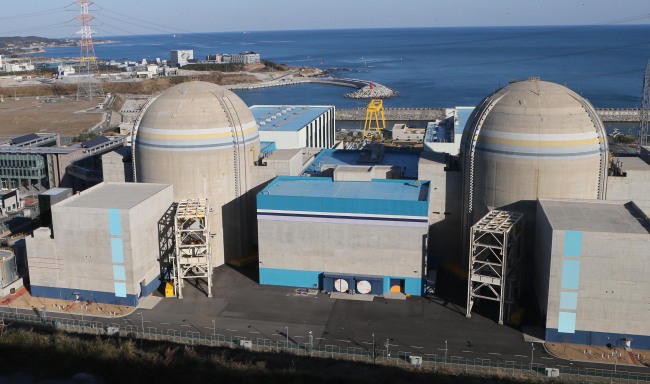Halted reactors threaten summer shortages
Government suspends two reactors for faulty parts and puts off operation of two others
By Korea HeraldPublished : May 28, 2013 - 20:23
The Nuclear Safety and Security Commission on Tuesday suspended the operation of two nuclear reactors and delayed the scheduled operation of two other reactors for their use of substandard components.
The government’s decision prompted public concerns over electricity shortages this upcoming summer.
The suspended reactors were the Shin-Kori Reactor 2 in Busan and Shin-Wolsong Reactor 1 in North Gyeongsang Province, in which substandard parts were supplied under faulty quality warranties during the construction process, according to the commission.
The organization also put the brakes on the resumption of the Shin-Kori Reactor 1, which had been undergoing its regular maintenance, and the launch of the new Shin-Wolsong Reactor 2, which was in its final reviewing stage before commercial operation.
The government’s decision prompted public concerns over electricity shortages this upcoming summer.
The suspended reactors were the Shin-Kori Reactor 2 in Busan and Shin-Wolsong Reactor 1 in North Gyeongsang Province, in which substandard parts were supplied under faulty quality warranties during the construction process, according to the commission.
The organization also put the brakes on the resumption of the Shin-Kori Reactor 1, which had been undergoing its regular maintenance, and the launch of the new Shin-Wolsong Reactor 2, which was in its final reviewing stage before commercial operation.

The disputed parts were the control cables, a safety feature meant to deliver signals to the reactor’s cooling system if a nuclear accident takes place.
The flaws did not involve any radiation leak or pose threats to public safety but raised serious concerns over the nation’s electricity supply, which often came to its limits in recent years.
The electricity capacity of the Shin-Kori and Shin-Wolsong reactors combined is 2 million kilowatts, a considerable proportion of the nation’s total nuclear-generated capacity of 13 million kilowatts.
There are few means, however, to make for the loss as the 700,000 kilowatt-level Wolsong Reactor 3 is scheduled to halt operation early next month for its regular checkup.
President Park Geun-hye expressed “great concern” about the possibility of power shortages and instructed a thorough probe into the case. “It is an important issue directly linked to the safety of our people,” she told a Cabinet meeting.
The country currently operates 23 reactors, which supply about 30 percent of the total electricity consumption. Among them, 10 reactors have been suspended.
Following the commission’s announcement, the Ministry of Trade, Industry and Energy summoned an emergency council to prepare countermeasures.
“We are sorry to once again cause public anxiety with nuclear issues,” said Han Jin-hyun, vice minister in charge of energy and trade.
While pledging to take every measure possible to stabilize the nation’s energy supply, Han also demanded that the industrial circles cooperate in cutting down their internal demands.
“We will also investigate the Korea Electricity Power Engineering & Construction and the Korea Hydro & Nuclear Plant Corporation,” Han said.
The ministry also set to announce its summer season energy supply action plan within the week, moving up the original schedule.
This was not the first quality dispute about Korean nuclear reactors. The nuclear commission last year shut down two reactors at the Yeonggwang Nuclear Power Plant, claiming that most of their parts had been substandard.
“It is vital to set up immediate measures, or else the country’s electricity supply will reach a critical point in early June and the worst level ever in early August,” said Cheong Seung-il, director general of the ministry’s energy policy department.
By Bae Hyun-jung (tellme@heraldcorp.com)
-
Articles by Korea Herald



















![[Today’s K-pop] Treasure to publish magazine for debut anniversary](http://res.heraldm.com/phpwas/restmb_idxmake.php?idx=642&simg=/content/image/2024/07/26/20240726050551_0.jpg&u=)